Is Your Frenchie At Risk? 11 Common French Bulldog Health Issues
When you purchase through links on our site, we may earn a commission. Here’s how it works.
French Bulldogs are one of the most popular breeds in the U.S., loved for their playful nature and signature smushy faces. But this brachycephalic breed is prone to numerous health problems, especially respiratory, skin, joint, and spinal issues.
Table of Contents
Knowing the most common conditions can help you catch early symptoms and make informed decisions about your French Bulldog’s long-term care.
Planning Ahead For Vet Bills
French Bulldogs are prone to chronic health issues that can lead to frequent vet visits, emergency care, and even surgery. These costs add up quickly, especially for breed-specific problems such as breathing disorders or spinal conditions.
Pet insurance can help you manage unexpected expenses and avoid difficult financial decisions when your pup needs care. It’s best to enroll while your Frenchie is young, as most providers don’t cover pre-existing conditions.
11 Common French Bulldog Health Issues
French Bulldogs are one of the most popular breeds in the U.S., but they’re also one of the least healthy. A large study by the Royal Veterinary College found that more than 72% of Frenchies had at least one medical disorder.
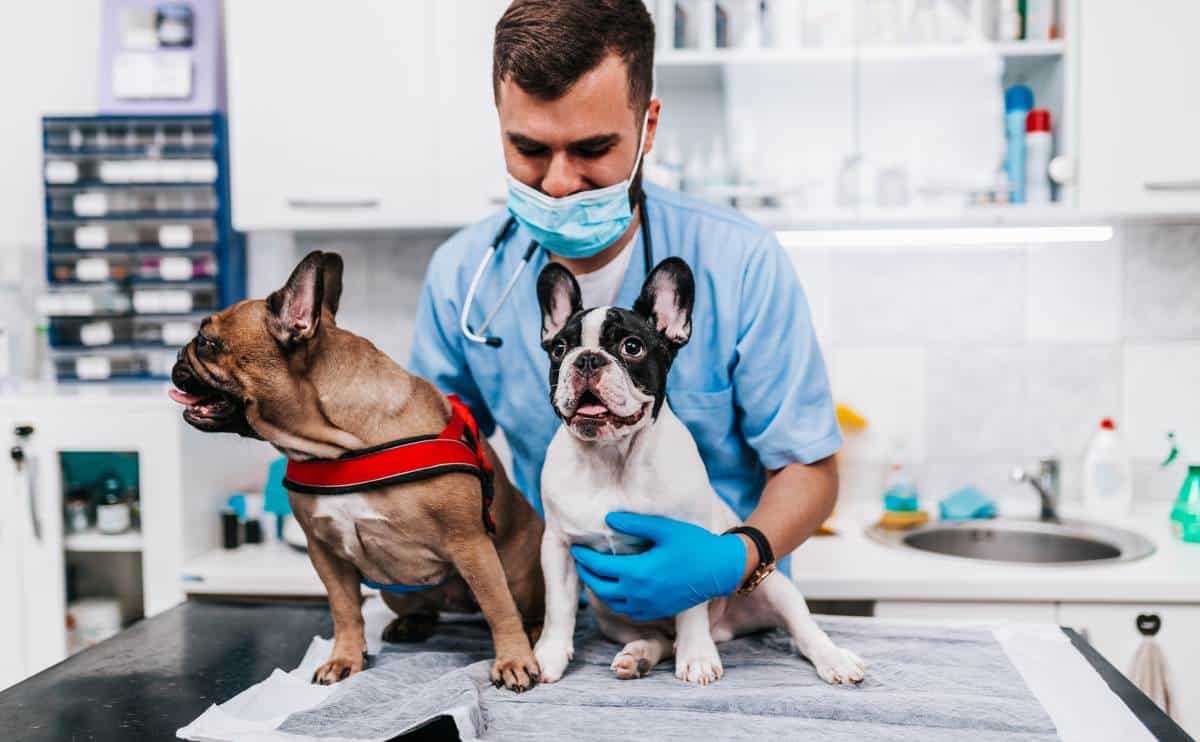
The data also showed that Frenchies had “significantly increased” odds of being diagnosed with 20 common conditions compared to other dog breeds. Here’s a top 12 list of the most common health issues that affect this breed.
To better understand this breed’s unique challenges, I spoke with Dr. Rebecca MacMillan, BVetMed, BSAVA, PGCertSAM, MRCVS, a practicing veterinarian and surgeon in the U.K. who regularly treats French Bulldogs.
Using insights from Dr. MacMillan and current research, I’ve compiled the most common health problems affecting Frenchies. Learning the signs of each condition can help you catch issues early and work with your vet to keep your dog as healthy as possible.
1. Brachycephalic Obstructive Airway Syndrome (BOAS)
“The most common problem I see with French Bulldogs in my practice is brachycephalic obstructive airway syndrome (BOAS),” says MacMillan. “Many Frenchies have breathing issues to varying degrees. These are caused by their narrowed, slit-like nostrils, flattened faces, elongated soft palates, and narrowed tracheas (windpipe).”

All brachycephalic breeds (flat-faced dogs like Frenchies, Pugs, and Boston Terriers) are prone to BOAS, but French Bulldogs are particularly vulnerable. According to the Humane Society Veterinary Medical Association, 50% of Frenchies show clinically significant signs of this condition.
BOAS Symptoms
Dogs with BOAS may show a range of symptoms, from mild discomfort to severe respiratory distress.
- Noisy breathing
- Snuffling
- Snoring when sleeping or relaxed
- Coughing and raspiness
- Reverse sneezing
- Exercise intolerance (snorting during activity)
- Heat intolerance
- Gagging and retching
Diagnosis & Treatment
Have your vet check your French Bulldog every one to two years, as BOAS often worsens with age and can shorten its lifespan.
- Mild cases: Managed with weight control, low-intensity exercise, and avoiding heat or stress.
- Severe cases: Surgery may be recommended to improve airflow and reduce breathing difficulties.
2. Heat Stroke
French Bulldogs are highly prone to heat stroke due to their flat faces and breathing limitations. Since dogs rely on panting to cool themselves, Frenchies often struggle to regulate their body temperature, even in mild weather.

Their shortened airway makes panting less effective, putting them at high risk for overheating during warm weather, exercise, or stress.
Heat Stroke Symptoms
Signs of heat stroke can escalate quickly and should be treated as an emergency.
- Excessive panting
- Rapid breathing
- Dry, sticky gums
- Lethargy
- Seizures
- Vomiting or diarrhea
- Collapse
- Loss of consciousness
- Disorientation or confusion
Diagnosis & Treatment
If you suspect heat stroke, act immediately.
- Move your dog to a cool area and offer fresh water.
- Use cool (not cold) water, damp towels, or fans to reduce body temperature.
- Seek emergency veterinary care, where treatment may include IV fluids, oxygen therapy, and temperature monitoring.
Prevention is key. Avoid outdoor activity in hot or humid weather, and never leave your dog in a parked car.
3. Skin Problems
French Bulldogs are famous for their wrinkly, expressive faces, but those signature folds can become a breeding ground for bacteria and yeast. This can lead to frequent bouts of skin fold dermatitis and skin infections.
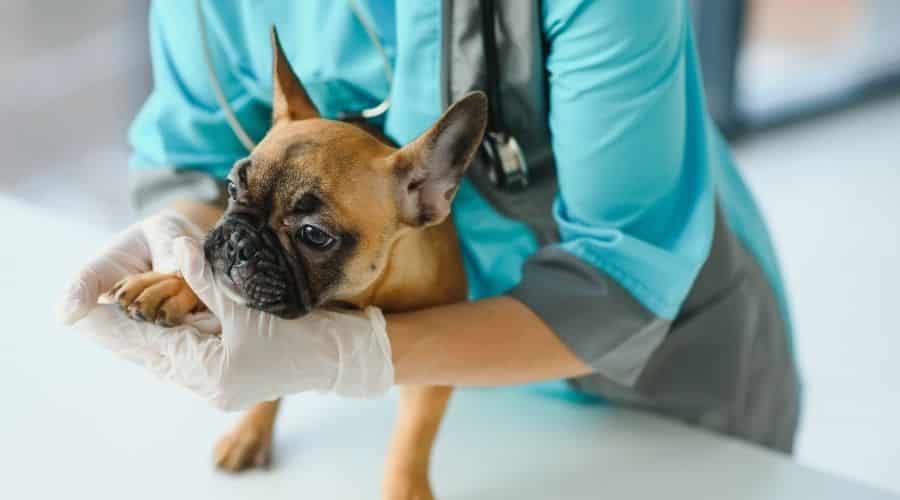
Frenchies are also genetically prone to skin allergies. These often manifest as chronic itching, licking, or sore patches and may be triggered by environmental factors or food sensitivities.
“Skin allergies are also extremely common in this breed,” says Dr. MacMillan. “If your dog licks his paws frequently, scratches excessively, or has sore ears or patches of skin, then you must seek veterinary help for this.”
Allergy Symptoms
Frenchies may experience one or more of the following symptoms.
- Excessive scratching, licking, or chewing
- Red or inflamed skin
- Pustules or papules (pimple-like bumps)
- Dry or flaky skin
- Patchy fur loss
- Itchy ears
- Swollen face or paws
Diagnosis & Treatment
Determining the cause of your dog’s skin problems can be a time-consuming process. Your veterinarian may use a food elimination diet, allergy testing, or trial medications to help narrow down the cause.
- Treatment may include allergy medications, medicated baths, or a prescription diet.
- Regularly cleaning your dog’s skin and tail folds can help prevent infections.
- Lifelong allergy management is often necessary and can be expensive over time.
Consider At-Home Allergy Testing
Some owners also choose to try an at-home dog allergy test. These kits analyze saliva or hair samples to check for potential food and environmental sensitivities. While not a replacement for a veterinary diagnosis, the results may help guide future discussions with your vet.

4. Ear Infections
French Bulldogs are known for their large, bat-like ears, but their unique ear shape presents challenges. Their ear canals are narrower than those of many other breeds, making it easier for debris and moisture to become trapped and lead to infection.
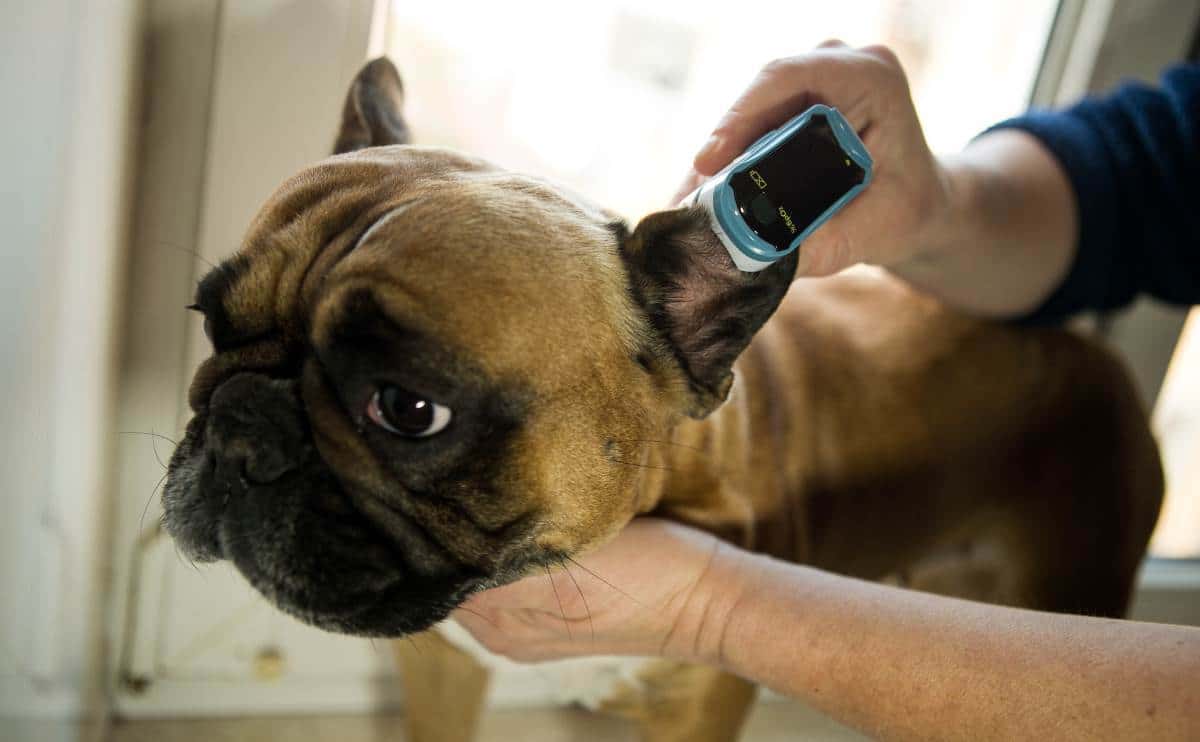
Wide ear openings also make French Bulldogs more susceptible to bacteria and allergens entering the ear canal. Allergies are another common trigger and may cause frequent or chronic ear infections over time.
Ear Infection Symptoms
Signs of an ear infection can range from mild irritation to more serious inflammation.
- Head shaking
- Scratching the ear or surrounding area
- Rubbing ear on the floor or furniture
- Redness or swelling
- Strong ear odor
- Yellow, brown, or bloody discharge
- Fur loss around the ear
- Scabs or crusted skin near the ear flaps
Diagnosis & Treatment
Most minor ear infections clear up with prompt veterinary care and ear-cleaning routines. However, repeated infections can lead to long-term damage.
- Chronic impact: Long-term infections can permanently narrow the ear canal and increase the risk of middle or inner ear disease
- Regularly cleaning and managing underlying allergies are key to prevention.
5. Chronic Diarrhea
French Bulldogs are prone to digestive issues, especially chronic diarrhea. Food allergies often cause this, but some cases are linked to inflammatory bowel disease (IBD) or a more severe condition known as granulomatous colitis (GC).

GC is a rare but serious form of IBD seen in French Bulldogs. It can lead to weight loss, anemia, and severe gastrointestinal distress if left untreated.
Chronic Diarrhea Symptoms
Symptoms may vary depending on the cause, but persistent diarrhea is the most common sign.
- Loose or watery stool
- Frequent bowel movements
- Blood or mucus in stool (in more severe cases)
- Weight loss
- Poor appetite
- Lethargy
Diagnosis & Treatment
Your vet may perform stool testing, food trials, or even intestinal biopsies to determine the cause. Treatment depends on the diagnosis.
- Mild to moderate cases: Managed with diet changes, allergy testing, or prescription food
- Granulomatous colitis: Typically treated with antibiotics
- Ongoing IBD: May require long-term medication and specialized diets
6. Hip Dysplasia
Hip dysplasia is a genetically inherited condition that affects the development of the hip joint. In French Bulldogs, the head of the femur does not fit properly into the hip socket, resulting in instability and joint deterioration over time.
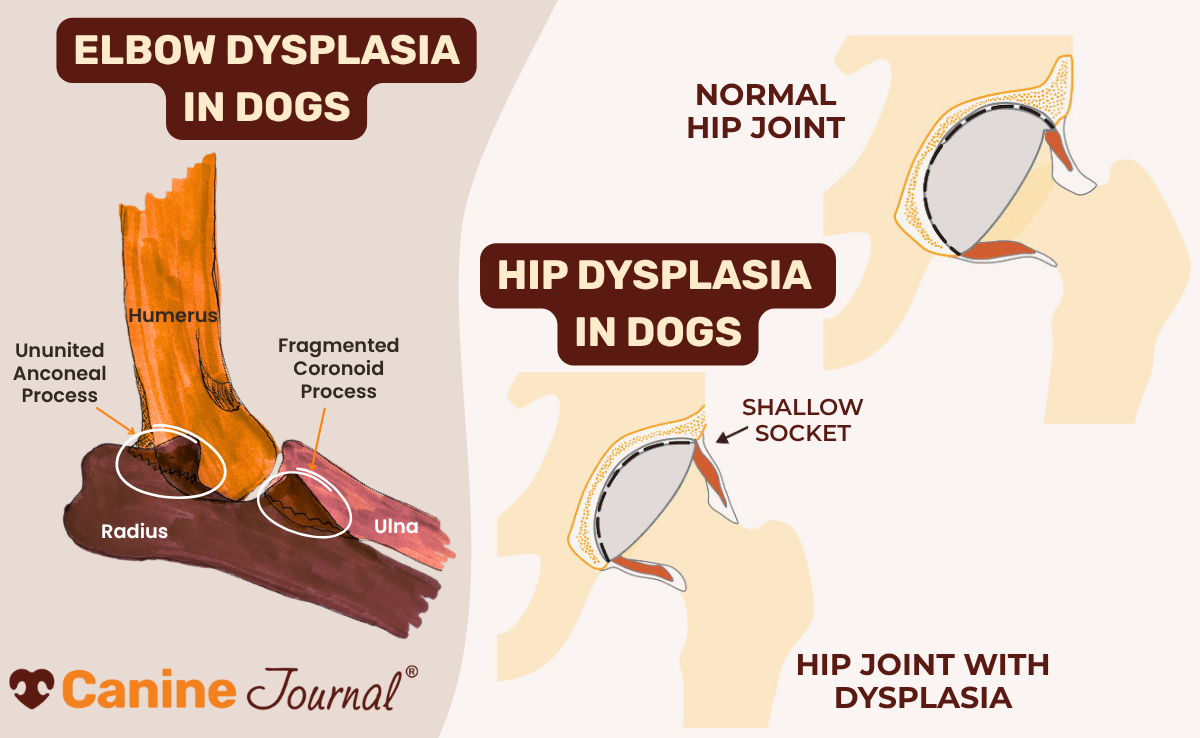
This misalignment often results in pain, arthritis, and limited mobility, especially as the dog ages.
Prevalence: Hip dysplasia is a known issue in French Bulldogs and is included in the breed’s recommended health screenings by the Canine Health Information Center.
Hip Dysplasia Symptoms
Signs typically appear during or after physical activity and may worsen with age.
- Pain or discomfort during exercise
- Lameness
- Stiff back legs
- Bunny hop–like run
- Stiffness when getting up or down
- Difficulty rising
- Muscle loss in the back legs
- Decreased interest in physical activity
Diagnosis & Treatment
A veterinary examination and x-rays are necessary to confirm the diagnosis and determine the severity.
- Mild to moderate cases: Managed with joint supplements, anti-inflammatory medication, weight management, and physical therapy
- Severe cases: May require surgical intervention to improve joint function and reduce pain
7. Patella Luxation
Patella luxation is a common hereditary joint issue in French Bulldogs. It occurs when the kneecap (patella) slips out of its normal position in the groove of the thigh bone. The condition primarily affects the hind legs and is typically present in both knees in approximately half of all cases.
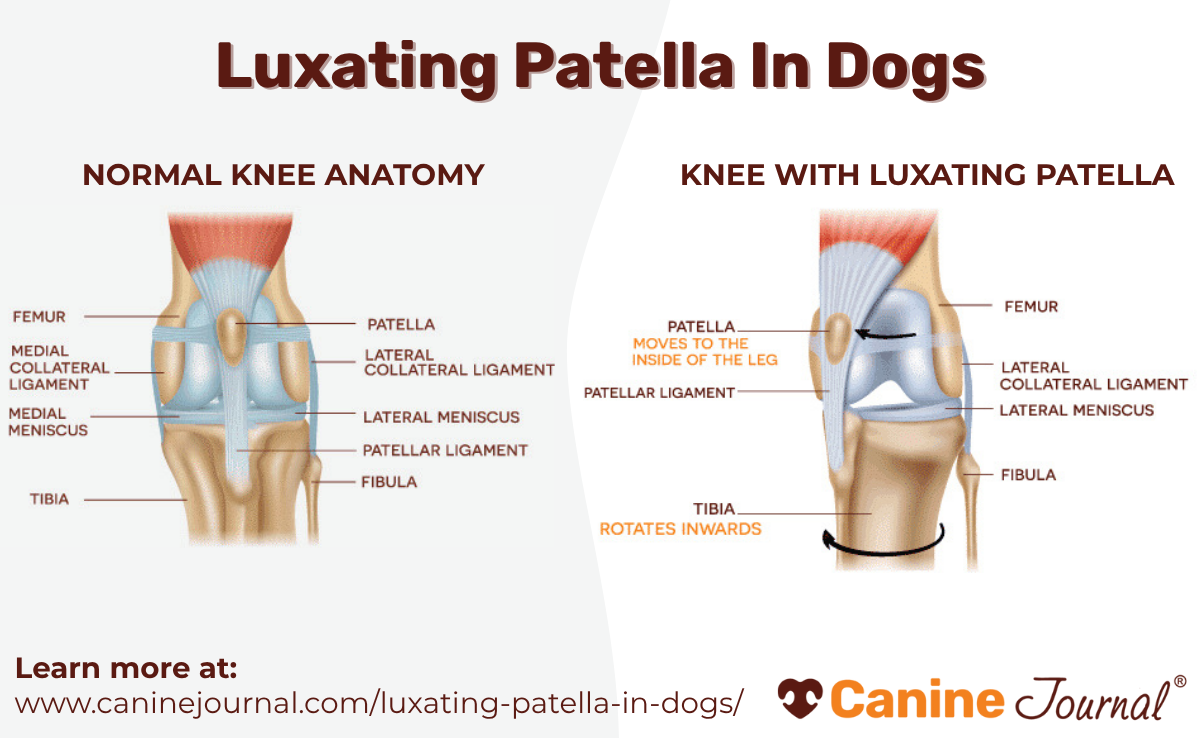
Frenchies are particularly prone to this problem due to their compact build and genetic predisposition, making it one of the most frequently diagnosed orthopedic conditions in the breed.
Patella Luxation Symptoms
Most dogs begin showing signs between four and six months of age.
- Hopping on one hind leg
- Holding a leg up intermittently
- Running on three legs
- Stretching the leg to realign the kneecap
After the kneecap pops back into place, dogs often resume walking normally. However, the condition tends to progress over time, leading to more frequent dislocations and potential damage to the joints.
Diagnosis & Treatment
Your vet will examine the joint and assign a grade from 1 to 4 based on severity.
- Mild cases: May be managed with joint supplements, exercise restriction, and weight control
- Severe cases: Surgical intervention is often recommended to stabilize the joint and prevent further wear and tear
8. Intervertebral Disc Disease (IVDD)
IVDD is a serious spinal condition that occurs when the cushioning discs between the vertebrae deteriorate or shift out of place, pressing on the spinal cord and causing pain or nerve damage. French Bulldogs are one of the top five breeds most affected by IVDD, according to an extensive veterinary study.

Their compact, muscular build and short legs are believed to contribute to early disc degeneration, especially in the lower back and neck.
Signs may appear gradually or come on suddenly, depending on the severity and location of the disc injury.
IVDD Symptoms
- Abnormal or unsteady walking
- Hunched back or stiff neck
- Crying out in pain
- Reluctance to move or climb stairs
- Loss of bladder or bowel control
- Paralysis (in severe cases)
Diagnosis & Treatment
Your vet may recommend imaging (like X-rays or MRI) to confirm disc damage. Treatment depends on severity.
- Severe cases: May require surgery to relieve pressure on the spinal cord and prevent permanent damage
- Mild to moderate cases: Typically managed with anti-inflammatory medication, pain control, and strict rest
9. Multiple Eye Problems
French Bulldogs are genetically prone to a variety of eye disorders. Their large, prominent eyes may be endearing, but this exaggerated feature also puts them at high risk for injury, infection, and chronic conditions.
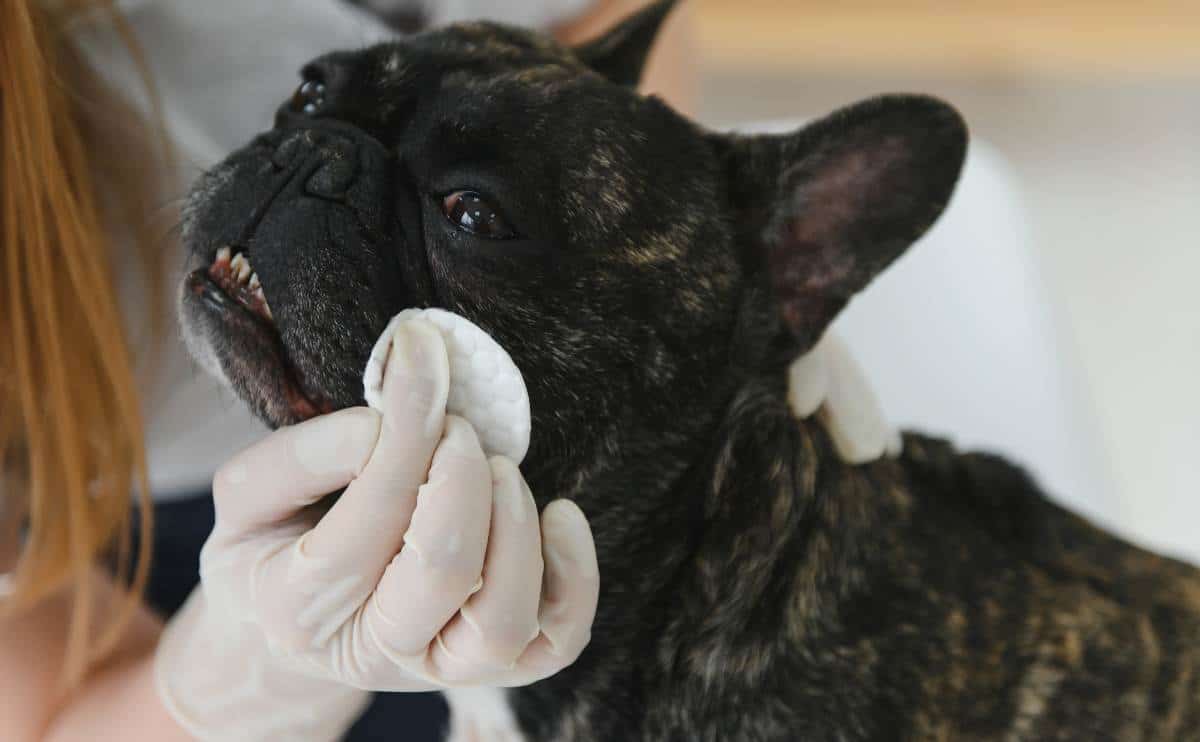
Many Frenchies experience more than one eye issue during their lifetime. Here are some of the most common eye problems in the breed:
Dry Eye (Keratoconjunctivitis Sicca)
This chronic condition occurs when the eyes fail to produce sufficient tears, resulting in inflammation and discomfort. It often requires long-term use of tear-stimulating drops prescribed by your veterinarian.
Cherry Eye
Cherry eye happens when the tear gland in the third eyelid prolapses and becomes visible as a pink or red mass in the corner of the eye. It frequently recurs and usually requires surgery to reposition the gland.
Entropion
This inherited condition causes the eyelids to roll inward, allowing the eyelashes to rub against the cornea. Left untreated, it can lead to chronic irritation and corneal ulcers. Surgery is typically needed to correct the eyelid position.
Corneal Ulcers
These are open wounds on the cornea, often caused by injury, infection, or secondary to dry eye or entropion. Treatment may include antibiotic and anti-inflammatory eye drops, as well as surgery in some cases.
Cataracts
Cataracts occur when the lens of the eye becomes cloudy, eventually blocking light and impairing vision. In advanced cases, cataracts surgery may be required to restore sight.
Eye Problem Symptoms
Many eye disorders in French Bulldogs share similar warning signs.
- Eye sensitivity
- Squinty eyes
- Repeated blinking
- Bloodshot or cloudy eyes
- Yellow or green discharge
If you notice any of these symptoms, schedule a vet visit as soon as possible. Prompt treatment can prevent permanent damage and preserve your Frenchie’s vision.
10. Brain Tumors
French Bulldogs are among the top breeds at risk for developing brain tumors, including gliomas and pituitary tumors. A 2015 study found that Frenchies are one of the four breeds most likely to develop glioma, a common and aggressive type of brain cancer.

Their short skull shape and compact facial structure may contribute to this increased risk, and tumors can appear even in younger dogs.
Brain Tumor Symptoms
Symptoms depend on the tumor’s location and how much it affects the surrounding brain tissue.
- Seizures
- Abnormal behavior or personality changes
- Vision problems
- Unsteady gait
- Walking in circles
- Loss of appetite or thirst
Diagnosis & Treatment
Brain tumors are typically diagnosed through advanced imaging such as MRI or CT scans, since X-rays are not effective for this purpose.
Treatment may include:
- Surgical removal (if possible)
- Stereotactic radiosurgery (SRS)
- Radiation therapy
- Chemotherapy
- Palliative care to manage symptoms
If your dog develops sudden neurological changes, your vet may refer you to a veterinary neurologist for further evaluation.
11. Dental Problems
French Bulldogs are highly prone to dental disease due to their small mouths and shortened jaws.
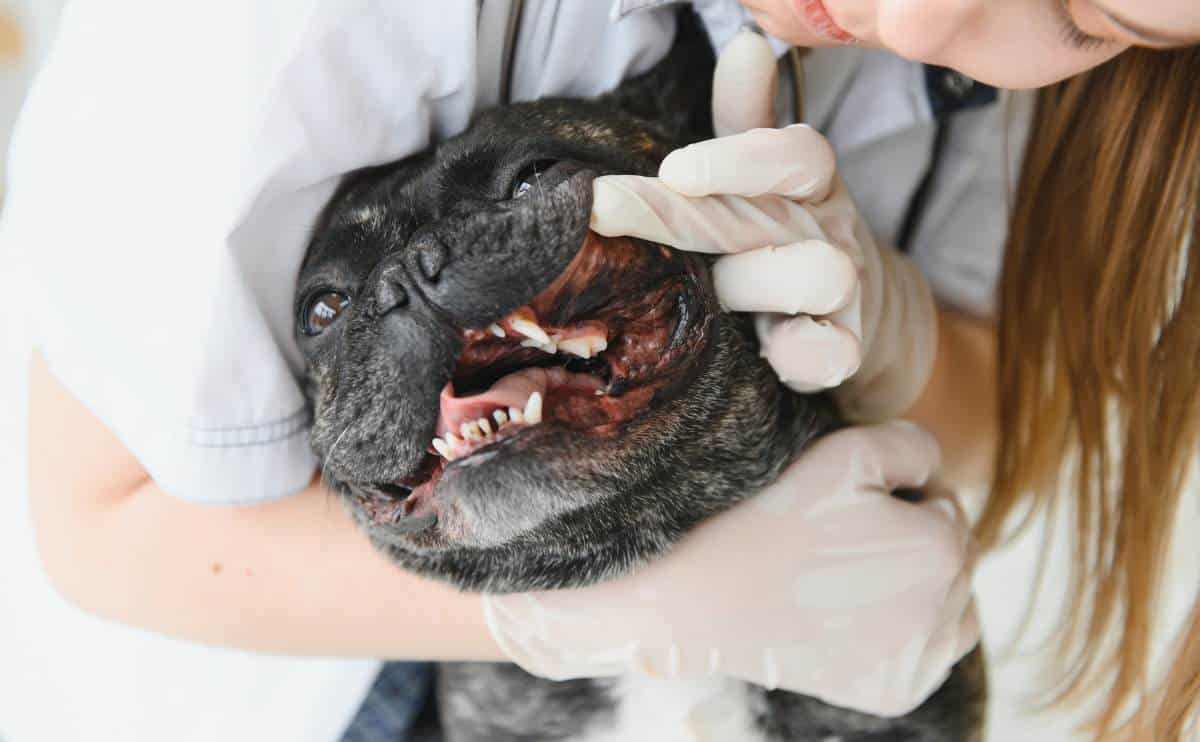
Like all dogs, they have 42 adult teeth. But in brachycephalic breeds, those teeth are crowded together, making it harder to keep them clean.
Tooth overcrowding leads to plaque and tartar buildup, which can quickly progress into gum inflammation, infection, and bone loss.
Dental Problem Symptoms
Watch for these signs of dental disease in your Frenchie:
- Bad breath
- Brown or yellow teeth
- Loose teeth or tooth loss
- Plaque and tartar buildup
- Red or bleeding gums
- Swollen gums
- Trouble eating or chewing
Diagnosis & Treatment
A veterinary dental exam is the first step in assessing the severity of gum disease. Treatment depends on the stage.
- Mild to moderate cases: Often treated with professional dental cleaning and improved home care
- Advanced cases: May require deep cleaning under anesthesia and tooth extractions
Regular brushing and professional cleanings can help prevent the progression of dental issues and improve your dog’s overall health.
Average Costs For Several Frenchie Health Issues
French Bulldogs often face multiple chronic health conditions, and the cost of care can add up quickly. Insurance claims data from major providers offer a snapshot of what owners might expect to spend on treatment.
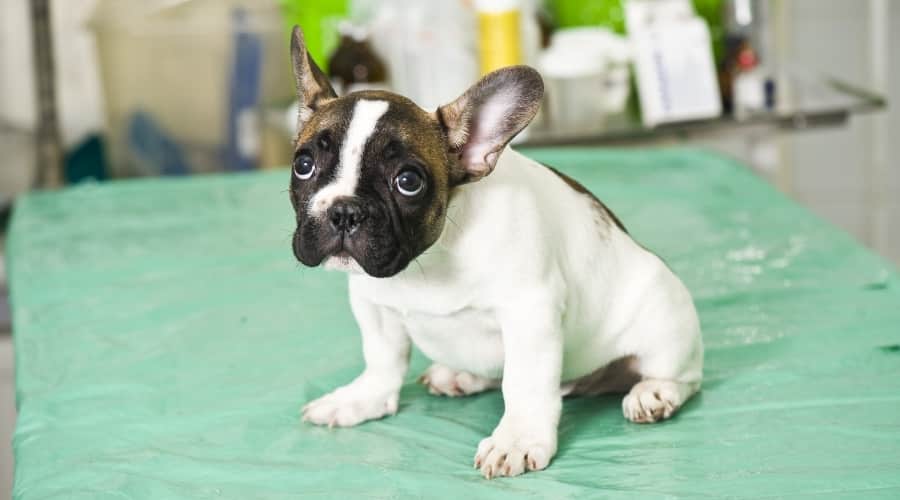
According to Fetch Pet Insurance:
- Allergies: $1,400 to $2,600
- Eye inflammation: $475 to $850
- Respiratory infections: $1,425 to $2,600
According to Embrace Pet Insurance:
- IVDD: $2,500-$7,000
- Hip dysplasia: $1,500-$6,000
- Entropion: $300-$1,500
These are average claim amounts and may vary based on your dog’s age, health status, and the complexity of care needed. In some cases, ongoing treatment or surgery may be required, which can increase total costs significantly.
Frequently Asked Questions
Here are some questions our readers ask most often about French Bulldog health problems. Don’t see yours here? Ask us in our comments.
What Do French Bulldogs Usually Die From?
A study of Frenchies in the U.K. by the Royal Veterinary College reported that the leading causes of death were brain disorders, such as brain tumors, and spinal cord disorders, like IVDD. Other common causes of death included respiratory complications and cancer.
What Is The Life Expectancy Of A French Bulldog?
The average life expectancy of a French Bulldog is 10 to 12 years. However, several factors impact every pup’s lifespan, including genetics, overall health, and lifestyle.
Why Are Frenchies Predisposed To So Many Health Issues?
Decades of selective breeding for aesthetic features have contributed to the multiple health problems that French Bulldogs and several other brachycephalic breeds face. Because of the soaring popularity of this breed for its appearance, breeders haven’t properly weeded out many of the hereditary issues Frenchies can inherit.
However, this problem is gaining more attention. In the U.S., the French Bulldog Club of America has partnered with the Canine Health Information Center (CHIC). The CHIC researches and maintains information on the health issues prevalent in specific breeds and has established a recommended protocol for breed-specific health screenings.
For Frenchies, these currently include hip, eye, patella, and cardiac (heart) screenings.
Should I Get A French Bulldog?
French Bulldogs make loving companions, but they come with significant health concerns, including breathing issues and genetic disorders. Before deciding, consider the long-term care they require.
Learn more about the potential downsides: Reasons Not to Get a French Bulldog.
What’s The Best Diet For French Bulldogs?
Because Frenchies are prone to so many health issues, feeding them the healthiest diet possible can help keep symptoms at bay and boost their immune systems to fight off their risk for infections. See our top picks for the best dog food for French Bulldogs in all life stages. You may also want to check out our reviews of the best dog food for allergies and the best dog food for sensitive stomachs if these are health issues your pup faces.




